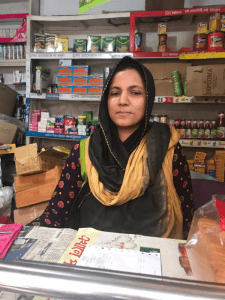A woman micro-merchant who went digital to build resilience during the COVID-19 pandemic
by Samveet Sahoo and Avi Hossain
Dec 3, 2020
4 min
As part of the i3 Program in Bangladesh, we met Khushi, a micro-merchant in Khilgaon, Dhaka. Khushi’s story reflects the journey of more than 2 million micro-merchants who transitioned to a digital mode of payment and kept their businesses running during the COVID-19 pandemic.
“I always thought mobile money companies partner only with supermarkets and malls in Dhaka. But, COVID has changed everything. The government wants small shopkeepers to support them by using digital cash. I am happy I am able to contribute and keep my country safe by using digital payments.” says Khushi, a grocery shop owner in Dhaka.

“These days, many superstores and branded shops accept digital payments through mobile financial service (MFS) wallets. I recently used my bKash wallet at a shoe store,” says Khushi. As a customer, she found the process straightforward and simple to follow. Although she is not aware of the backend process of a digital wallet transaction, Khushi finds the process quite fast, attractive, and easy.
Khushi is also interested in opening a merchant MFS account to accept digital payments from her customers. She mentions, “I already receive one or two payments daily in my personal MFS wallet from customers, but only if they are short of cash.” However, Khushi does not encourage digital payments, as cash withdrawal from her MFS wallet is chargeable.
Unfolding the impact of the pandemic
The onset of the COVID-19 pandemic in Bangladesh saw restricted mobility due to lockdowns in Q2 and Q3 2020. This also affected Khushi’s business. She was only allowed to keep the shop open until 2 p.m., less than half of her usual business hours. Khushi also cut down her expenditure to basic household necessities and even dipped into her savings to manage expenses and cover losses. These circumstances persisted until June, 2020. As the situation gradually returns to normal, Khushi feels she will be able to resume regular business operations and continue with her regular business.
Khushi notes, “I hear from other grocers that before COVID-19, MFS providers only partnered with retail chains, branded shops, and large restaurants. They were less interested to tie up with small merchants like us.” Khushi believes this has changed because micro-merchants like her cater to hundreds of customers every day. MFS providers now recognize the value of onboarding these merchants, especially in light of the COVID-19 pandemic. Now customers and merchants alike perceive digital payments as a quicker, easier, and safer way to transact. Khushi is hopeful that some providers will eventually see the value of onboarding women micro-merchants on the MFS platform. She concludes, “I studied until the higher secondary level and I am also comfortable using a mobile or any digital device to conduct transactions. But I suspect providers need to see the value of partnering with us (women-led businesses).”
Key takeaways
Small and emerging micro-merchants like Khushi are part of the thousands of micro-enterprises that operate in Bangladesh. The retail commerce landscape has been changing rapidly. Since 2012-2013, it contributes an average of 13% to the Gross Domestic Product (GDP) of Bangladesh. Micro-merchants are the backbone of the economy and essential to the government’s agenda. This involves achieving targets that include the Sustainable Development Goal (SDG) agenda and the Vision 2021 commitment to provide financial services at the doorsteps of the citizen.
The demand for digital payments as an option is on the rise among urban and semi-urban micro-merchants. A digital-ready merchant can build a credible profile and possibly access credit based on a digital trail of transactions. Ever-increasing smartphone ownership (40% of the population) and internet penetration (25% of the population) can fuel the growing interest in digital transaction options across all demographic strata. The concerted effort of providers will not only bring more merchants into the digital fold but also help retain the money or float of customers within their digital eco-system.
MicroSave Consulting (MSC), with support from MetLife Foundation, has been implementing the i3 Program Bangladesh and Vietnam since 2018. The i3 program, which stands for “Innovate, Implement, and Impact,” works to utilize digital technology and uncover deep insights into the needs, aspirations, and behaviors of low and moderate-income (LMI) people to build and deliver financial services for the mass market. MSC has been working with frontrunners in financial services, from banks to FinTechs and wallet providers to governments, to help LMI segments move toward better financial health by supporting micro-merchants like Khushi through demand- and supply-side interventions.
We look forward to continued dialogue, learning, and supporting financial inclusion in Bangladesh. Stay tuned for more updates on www.i3program.org.
Written by

Samveet Sahoo
Senior Manager
 by
by  Dec 3, 2020
Dec 3, 2020 4 min
4 min
Leave comments